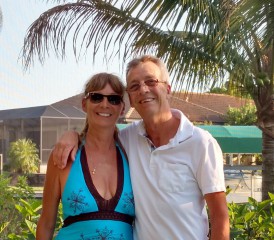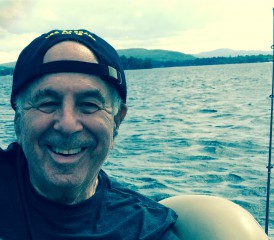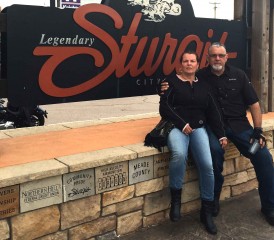Mesothelioma Survivor Fought Disease, Overcame His Fears

Fact Checked | Written by: Tim Povtak | Last Update: 06/26/2025 | 5 Min Read
Mesothelioma survivor John Owens still remembers driving himself to the hospital in the predawn darkness for the life-changing surgery that removed his left lung, much of his diaphragm and other assorted body parts.
He left his family at home. This was his fight alone.
It was much the same for presurgery chemotherapy, postsurgery radiation and several follow-up visits. Although Owens is a personable, friendly guy with a loving family, he insisted his cancer battle be mostly a one-on-one affair.
“You can call it selfish, and maybe crazy, but I didn’t want anyone with me. Sure, it was a scary time, but I didn’t like the idea of people seeing me at my most vulnerable,” Owens said from his home near Ann Arbor, Michigan. “It was me against mesothelioma. And let’s see who is going to win.”
He won and is still the champion.
Owens remains standing today, seven years after an extrapleural pneumonectomy (EPP), which is the most aggressive surgery possible. His latest scans show no sign of the incurable disease.
“My oncologist today calls me his freak,” Owens said proudly. “They usually don’t get to talk to people who live this long like me. I like to think I’m cured. I’m not exactly sure why, but I just had a great team of doctors who provided unbelievable care. The stars lined up perfectly for me.”
Great Cancer Care Close to Home
Dr. Vita McCabe performed the complex surgery and directed his care at nearby St. Joseph Mercy Hospital in Ann Arbor. Owens rejected the option of traveling to a more well-known mesothelioma specialty center in a major city, believing he could find the same great care close to home.
He did it his way.
Owens was just 47 when diagnosed, considerably younger and healthier than most mesothelioma patients. His disease was discovered after an uncharacteristic and repeated struggle to catch his breath while playing ice hockey.
“At first I was thinking, ‘I have to quit smoking.’ But a lot of other players were smokers, too, and they weren’t having problems,” he said. “That was my first indication that something was wrong. When the doctor listened to my lungs, he told me that something just wasn’t right. Eventually, it led to a diagnosis. I had no clue what mesothelioma was at first. And then I just figured, ‘I’m going to die.'”
Owens believes the mesothelioma may have stemmed from a job during his teens. He had worked summers at his grandfather’s heating and cooling business. One of his duties was tearing apart old furnaces covered with asbestos.
He also spent his working years in the road-building business, operating heavy equipment around steaming asphalt.
Never Lost His Enthusiasm for Living
Owens was forced into early retirement by the cancer that changed his life, but it never dimmed his enthusiasm for living, positive attitude or zest for doing things his way.
He loved his family, but he wanted no sympathy from anyone.
“I was never one to back down from a challenge, and I wasn’t going to start with this cancer,” he said. “Sure, I was scared to death, but I didn’t want people to know that. Support is good to have, and I had it for sure. My family was wonderful, but this was my battle all the way, head-on, with a let’s-see-what-happens attitude.”
Life after surgery and subsequent treatment was difficult, but Owens embraced the fight. He went from a sturdy 170 pounds to a leaner 140 pounds.
The month-long radiation treatments were tough. He said it felt as if his insides were cooking. Although he believes they helped prevent any future tumor recurrence, they also damaged his heart, as his radiologist predicted they might.
He needed a pacemaker implanted two years ago.
“It’s strange where your mind goes. I asked the doctor who put in the pacemaker, “What happens if I get run over by a bus when I walk out of your office? I’ll obviously be dead, but the pacemaker will still make my heart beat. Will they keep working on me?” Owens recalled. “He said no one had ever asked that question before.”
Swimming in Circles
Owens jokes about his lifestyle now, which has slowed considerably but remains surprisingly busy. The ice hockey is finished, but he still cuts his own grass and tends to the garden. He loves boating, and spends winters in Florida with his wife, Colleen. She laughs at how he swims.
“Because of the surgery, I can’t lift my left arm very high, so I end up always swimming in circles,” he said. “When I’m working in my yard, only my right side sweats. My left side, where they took everything out, stays dry. Pretty amazing!”
He believes his age, and his attitude, played a big role in his comeback after surgery. Owens remained in intensive care for almost two weeks. His parents, wife, children and grandchildren helped him through the recovery process, despite his reluctance at times. Moving wasn’t easy at first with a rebuilt chest cavity.
“The surgeons used a lot of Gore-Tex to hold everything in place, and rebuild the diaphragm,” he said. “I kind of wonder now, if I ever get shot, would the bullet just bounce off me? It’s something to think about.”
His oncologist has told him there is no sign of any tumor recurrence. The CT scans have gone from once every three months, to every six months, and now every 12 months.
He has no checkups scheduled again until next August. He believes his seven-year survival will become 17 years and beyond. There are days he doesn’t feel well, but he rarely complains. It’s not his style.
“The doctor told me I’m cancer-free, and I’ll never have to worry about mesothelioma again,” he said. “I feel lucky, but I don’t feel like a miracle. I’ll reserve miracles for bigger and better things than me. I’m just a grateful guy today who thinks every day I wake up is a gift.”





